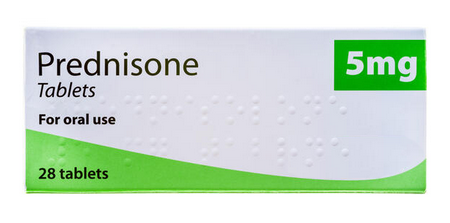Buy Prednisone (Prelone) Online Without Prescription

| Product Name: | Prednisone |
|---|---|
| Dosage: | 5 mg, 10 mg, 20 mg, 40 mg |
| Price: | $0.45 – Per Pill |
| Where To Buy Online: | OnlinePharmacy |
What is Prednisone?
Prednisone is a corticosteroid, a man-made form of a natural substance (corticosteroid hormone) produced by the adrenal gland. It works by reducing inflammation and modifying the body's immune system, making it an invaluable tool in the treatment of a plethora of conditions from allergies to autoimmune diseases.
Given its properties, Prednisone is prescribed for conditions where the immune system attacks its tissues, leading to inflammation, pain, and damage. Some of these conditions include arthritis, lupus, and multiple sclerosis.
Generic Prednisone Availability
Generic medications are fundamentally equivalent to their branded counterparts in dosage form, safety, strength, route of administration, quality, and intended use. Prednisone is available both as a brand-name drug (like Prelone) and in its generic form. The generic versions provide a cost-effective alternative without compromising the therapeutic benefits.
It's crucial to remember that while the generic form might be less expensive, its efficacy remains on par with the brand-name product. Always consult with your healthcare provider regarding the most suitable choice for your individual needs.
In what forms Prednisone is available?
Prednisone boasts a versatile range of formulations tailored to cater to varying patient needs. These include:
- Tablets: A common oral form that is easy to administer.
- Liquid solutions: Suitable for those who might find swallowing tablets challenging.
- Eye drops: Directly treats ocular conditions.
- Injections: Administered in cases that require rapid action or when oral intake is not feasible.
Each form is designed to deliver the medication effectively, ensuring that patients can access the most appropriate method for their condition and comfort.
How to Use Prednisone?
The method of using Prednisone varies based on its form and the specific condition it's prescribed for. Always follow your doctor's instructions meticulously. Generally, when taken orally, it's recommended to consume the medication with food to minimize potential gastric discomfort.
Dosages and duration of treatment depend on the patient's age, the severity of the condition, and how the patient responds to the treatment. It's essential to take this medication at evenly spaced intervals to keep a consistent level in the bloodstream.
Who can and cannot take Prednisone?
Prednisone, while potent and beneficial, is not suitable for everyone. Those who can take this medication typically include individuals with inflammatory conditions, autoimmune disorders, and certain allergies.
However, certain individuals should exercise caution or avoid Prednisone altogether. These include:
- Patients with systemic fungal infections.
- Those who've recently received a live vaccine.
- Individuals with certain types of parasitic infections.
What is important to know before using Prednisone?
Before embarking on a treatment journey with Prednisone, several considerations warrant attention. Foremost is the potential interaction with other medications. Ensure your healthcare provider is aware of all other medicines, vitamins, or supplements you're currently taking.
It's also imperative to discuss your medical history, especially if you have had issues like liver disease, kidney disease, thyroid disorders, diabetes, or stomach ulcers. Pregnancy, planned surgeries, or recent vaccinations are other critical points to discuss with your doctor.
How do I take Prednisone?
Always follow the physician's guidelines. For oral forms:
- Take with food or milk.
- Use a specially marked measuring device to ensure accurate dosing.
- Adhere to the prescribed dosage; do not increase or decrease on your own.
For non-oral forms, like injections or eye drops, ensure you're familiar with the correct technique for administration and storage conditions to maintain the medicine's efficacy.
What adverse reactions can occur when taking Prednisone?
As with many medications, Prednisone can cause side effects. Commonly reported ones include weight gain, mood changes, insomnia, and digestive issues. While these are often mild and transient, it's crucial to monitor for more severe reactions.
Less common but more severe side effects can include vision problems, swelling, rapid weight gain, and unusual pain or tenderness. If you observe any alarming symptoms or side effects that persist or worsen, seek medical attention immediately.
Does Prednisone Improve Quality of Life?
When used appropriately, Prednisone can improve the quality of life in several ways:
-
Anti-inflammatory Action: Many diseases involve inflammation, which can cause pain, swelling, heat, and redness in affected tissues. Prednisone works by suppressing the immune system's inflammatory response, which can lead to a significant reduction in these symptoms.
Relief from Symptoms: Conditions such as asthma, rheumatoid arthritis, lupus, and certain allergic reactions can cause debilitating symptoms. By reducing inflammation, Prednisone can provide relief from pain, shortness of breath, joint swelling, and other symptoms.
Treatment of Autoimmune Diseases: In autoimmune diseases, the body's immune system mistakenly attacks its own tissues. Prednisone can modulate this response, helping to control conditions like lupus, rheumatoid arthritis, and multiple sclerosis.
Prevention of Organ Rejection: After an organ transplant, the body's immune system might recognize the new organ as foreign and try to reject it. Prednisone, often given in combination with other immunosuppressive drugs, can help prevent this rejection and increase the success rate of transplants.
Adjunctive Therapy: Prednisone is sometimes used in combination with other treatments, enhancing the effectiveness of the primary treatment. For example, it might be used alongside chemotherapy in certain cancers.
Treatment of certain eye conditions: Diseases like uveitis, an inflammation of the middle layer of the eye, can benefit from Prednisone use, either as eye drops or systemic therapy.
Skin conditions: Prednisone can be effective in treating certain skin conditions like severe eczema, psoriasis, and pemphigus, which can significantly impair the quality of life due to pain, itching, and cosmetic concerns.
